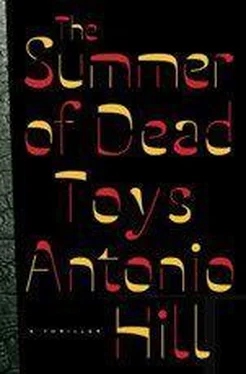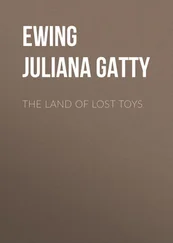Antonio Hill - The Summer of Dead Toys
Здесь есть возможность читать онлайн «Antonio Hill - The Summer of Dead Toys» весь текст электронной книги совершенно бесплатно (целиком полную версию без сокращений). В некоторых случаях можно слушать аудио, скачать через торрент в формате fb2 и присутствует краткое содержание. Жанр: Триллер, на английском языке. Описание произведения, (предисловие) а так же отзывы посетителей доступны на портале библиотеки ЛибКат.
- Название:The Summer of Dead Toys
- Автор:
- Жанр:
- Год:неизвестен
- ISBN:нет данных
- Рейтинг книги:4 / 5. Голосов: 1
-
Избранное:Добавить в избранное
- Отзывы:
-
Ваша оценка:
- 80
- 1
- 2
- 3
- 4
- 5
The Summer of Dead Toys: краткое содержание, описание и аннотация
Предлагаем к чтению аннотацию, описание, краткое содержание или предисловие (зависит от того, что написал сам автор книги «The Summer of Dead Toys»). Если вы не нашли необходимую информацию о книге — напишите в комментариях, мы постараемся отыскать её.
The Summer of Dead Toys — читать онлайн бесплатно полную книгу (весь текст) целиком
Ниже представлен текст книги, разбитый по страницам. Система сохранения места последней прочитанной страницы, позволяет с удобством читать онлайн бесплатно книгу «The Summer of Dead Toys», без необходимости каждый раз заново искать на чём Вы остановились. Поставьте закладку, и сможете в любой момент перейти на страницу, на которой закончили чтение.
Интервал:
Закладка:
8
As the car climbed toward the upmarket area of the city, the streets seemed to empty. From the dense, noisy traffic around Plaça Espanya, plagued by motorbikes taking advantage of the smallest gap to slip between the cars and taxis moving slowly forward like zombies awaiting a potential victim, they’d come in barely fifteen minutes to the wide expanses of Avinquda Sarrià: they crossed the city in the direction of the Ronda de Dalt. On a day like this, of blinding sun and suffocating temperatures, the sky gave the impression of having been whitewashed and the mountain, scarcely visible at the end of the long avenue, hinted at the promise of a cool oasis which contrasted with the scorching asphalt of three in the afternoon.
Sitting on the passenger side, Héctor contemplated the city without seeing it. By his sad expression and slight frown, one would say his thoughts were far away from those streets, roaming some shadier but not at all pleasant place. He hadn’t uttered a single word since they got into the car and Leire took the wheel. The silence might have been uncomfortable had she not also been lost in her own world. In fact, she was even grateful for those minutes of peace: the station had been hectic that morning and she wasn’t very proud of her performance in front of the superintendent. But the image of the “Predictor” confirming her fears with an intense purple color came into her mind at the most unexpected moments.
Héctor half-closed his eyes in an effort to re-order his thoughts: he hadn’t spoken to Andreu in private and he was dying to ask her if there was anything new in the case of the doctor. He also remembered that he’d called his son in the morning after coming out of the psychologist’s and he hadn’t returned his call. He looked at his mobile again, as if he could will it to ring.
A sudden braking jolted him back to his senses and he turned to his colleague, not knowing what had happened. He understood instantly on seeing an urban cyclist, a member of that reckless tribe that had recently invaded the streets, who turned toward them more offended than scared.
“I’m sorry,” Leire apologized. “That bike crossed suddenly.” He didn’t respond but nodded with a distracted air. Leire exhaled slowly: the bike hadn’t come out of nowhere; she’d simply become too distracted. Fuck, enough! She breathed deeply and decided that the silence was overwhelming, so she opted to strike up a conversation with the inspector before he got submerged in thought again.
“Thanks for before. In Superintendent Savall’s office,” she clarified. “My head was in the clouds.”
“Yeah,” he said. “It was obvious, to be honest.” He made an effort to follow the conversation: he was also sick of thinking. “But don’t worry: Savall barks a lot and bites very little.”
“I know I deserved the barks,” she replied, with a smile on her lips.
Héctor continued speaking without looking at her, his eyes straight ahead.
“How did the Castells family seem to you?” he asked out of the blue.
She took a few seconds to answer.
“It’s strange. . I thought it would be harder. Interrogating them about the death of a son only nineteen years old.”
“And it wasn’t?” His voice was still tense, rapid, but this time he deigned to turn toward her. Leire had the feeling of being in an oral exam and concentrated on finding the right answer.
“It wasn’t pleasant, that’s for sure. But not’-she searched for the word-“dramatic, either. I suppose they’re too reserved to make a scene, and after all she’s not his mother. . Although that doesn’t mean they don’t give free rein to their emotions when they’re alone.”
Héctor said nothing and the lack of comment made Leire expand on her answer.
“What’s more,” she continued, “I suppose religion helps its faithful in these cases. I’ve always envied that. Although at the same time I can’t quite swallow it.”
For the second time that day, the concept of God had come up. And when Héctor answered his companion, a little before they reached their destination, he did so with an explanation she didn’t fully understand.
“Believers have an advantage over us. They have someone to confide in, someone who protects or consoles them. A superior power that clears up their doubts and dictates their conduct. We, on the other hand, have only demons to fear.”
Leire noticed that he was speaking more to himself than to her. Fortunately, on her right she saw the modern façade of the building to which they were heading and, given that it was summer, the surrounding area was practically empty. She parked on the opposite corner, in the shade, without a problem.
Héctor got out of the car immediately; he needed a cigarette. He lit one without offering one to his colleague and smoked greedily, his eyes on the school Marc Castells had attended until the year before his death. While he smoked, she moved toward the railings that marked out the landscaped area: another consequence of this new condition her body was experiencing was that, although she felt like smoking, she couldn’t tolerate passive smoke. That place was as similar to the smalltown school in which she had studied as the White House is to a whitewashed shack. The rich still live in a different world, she said to herself. However much more equal things had become, the building in front of her-surrounded by gardens, with grass spread out like a green carpet, and with a gymnasium and an adjacent auditorium-strictly speaking looked more like a university campus than a school, and it marked the profound difference, from infancy, between a select group of students who enjoyed all these facilities as the most normal thing in the world, and all the other kids who only saw places like this in American sitcoms. By the time she realized this, the inspector had already put out his cigarette and was entering the open gate. Somewhat annoyed, feeling as if he were treating her like a chauffeur who should wait at the door, she followed him. In fact, the visit to the school was an impromptu, last-minute idea. Most likely, she said to herself, they’d find no one there at that hour, but he hadn’t asked her opinion. Typical boss, she thought as she walked a pace behind the inspector. At least this one has a nice ass.
They both moved down the wide, irregularly paved path that crossed the garden to the main building. The door was closed, as Leire expected, but opened with a metallic hum after Héctor rang the bell. A spacious corridor stretched before them, with a glass-walled office, no doubt the school secretary’s office. A middle-aged woman with a tired expression received them from the other side of the glass.
“I’m sorry, but we’re already closed.” She glanced toward a notice which clearly stated that the summer opening hours of the office were from nine until half past one. “If you want information on enrolment or about the centre you will have to come back tomorrow.”
“No, we’re not interested in enrolment,” said Héctor, showing her his badge. “I’m Inspector Salgado and this is Agent Castro. We wanted information about a pupil of this centre, Marc Castells.”
A glow of interest flickered in the woman’s eyes. No doubt this was the most exciting thing that had happened to her for a while.
“I suppose you are aware of what has happened,” continued Héctor in a formal tone.
“Of course! I myself took charge of sending a wreath to his funeral on behalf of the school.” She said it as if any doubt might offend. “A terrible thing! But I don’t know what I can tell you. It would be better to speak to one of the teachers, but I don’t know who is here. In summer they don’t keep a fixed schedule: they come in the mornings until the fifteenth to do paperwork and curriculum planning, but at lunchtime almost all of them disappear.”
Читать дальшеИнтервал:
Закладка:
Похожие книги на «The Summer of Dead Toys»
Представляем Вашему вниманию похожие книги на «The Summer of Dead Toys» списком для выбора. Мы отобрали схожую по названию и смыслу литературу в надежде предоставить читателям больше вариантов отыскать новые, интересные, ещё непрочитанные произведения.
Обсуждение, отзывы о книге «The Summer of Dead Toys» и просто собственные мнения читателей. Оставьте ваши комментарии, напишите, что Вы думаете о произведении, его смысле или главных героях. Укажите что конкретно понравилось, а что нет, и почему Вы так считаете.












